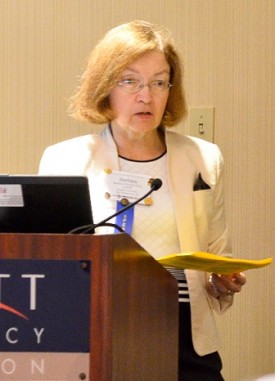Barbara O’Neill, Rutgers Cooperative Extension specialist in financial resource management presented three workshops at the 2013 American Association of Family & Consumer Sciences (AAFCS) Annual Conference, Embracing and Managing Change through Family & Consumer Sciences, in Houston, Texas, June 26-29.
At this year’s conference, O’Neill provided information on a variety of topics, such as financial planning skills for entrepreneurs and intrapreneurs, embracing the new frugality in tough economic times, and embracing and using new technologies to help teach personal finance.The later session focused on using a program called Xtranormal, which allows users to create videos to teach a topic. The creator makes a video using avatars, and when they are finished, it produces a link that can be viewed through email or online searches. Xtranormal requires no login to view the video; instead you just click on the link or copy and paste the URL. This program is a creative approach that makes learning fun and can be used to teach any content area.
During O’Neill’s 35 years of employment with Rutgers Cooperative Extension, she has taught over 30,000 adult learners, authored or co-authored eight books and held leadership roles in various associations. She holds numerous certifications, including certified financial planner (CFP), chartered retirement planning counselor (CRPC), accredited financial counselor (AFC), certified housing counselor (CHC), certified financial educator (CFEd) and certified in family and consumer sciences (CFCS).
More than 700 professionals and students in family and consumer sciences (FCS) and allied fields from across the U.S. convened at the Hyatt Regency Houston for the AAFCS Annual Conference. Experts in personal finance, health and nutrition, resource management, apparel and textiles, housing, and other areas of FCS presented research and strategies to address critical issues facing individuals, families and communities.
The meeting featured two prominent keynote speakers, including Dr. Steve Murdock, former director of the US Census Bureau and Andrew Crocker, extension specialist, Texas A&M AgriLife Extension Services, and offered a range of educational sessions on theme-related topics, from supporting military families to overcoming 21st century economic challenges.
About the American Association of Family & Consumer Sciences (AAFCS)
Based in the Washington, D.C., area, AAFCS is the only association for family and consumer sciences students and professionals across multiple practice settings and content areas. For more than 100 years, AAFCS has focused its mission on providing leadership and support for professionals whose work assists individuals, families, and communities in making more informed decisions about their well-being, relationships, and resources to achieve optimal quality of life. AAFCS members provide research-based knowledge about the topics of everyday life to help create healthy and sustainable families. These topics include human development, personal and family finance, housing and interior design, food science, nutrition and wellness, textiles and apparel, and consumer issues. AAFCS members are located nationwide, and include educators, administrators and managers, human service and business professionals, researchers, community volunteers, and consultants who develop research-based information and deliver programs on essential skills to help individuals and families be better prepared to live, work, and succeed in today’s complex and diverse world.
Field of Family & Consumer Sciences
Family and consumer sciences (FCS) draws from broad and diverse disciplines to develop and provide content and programs that help individuals become more effective critical thinkers and problem solvers. Through discovery and delivery of research-based knowledge, FCS professionals help individuals and families develop essential skills to successfully live and work in a complex world. Professionals in the field are uniquely qualified to speak on many critical issues affecting individuals and families, such as maintaining a healthy lifestyle, wisely managing personal and family finances, and creating supportive relationships with family members, friends, and co-workers. They are located nationwide in a variety of practice settings, including secondary schools, universities, government agencies, and businesses.


